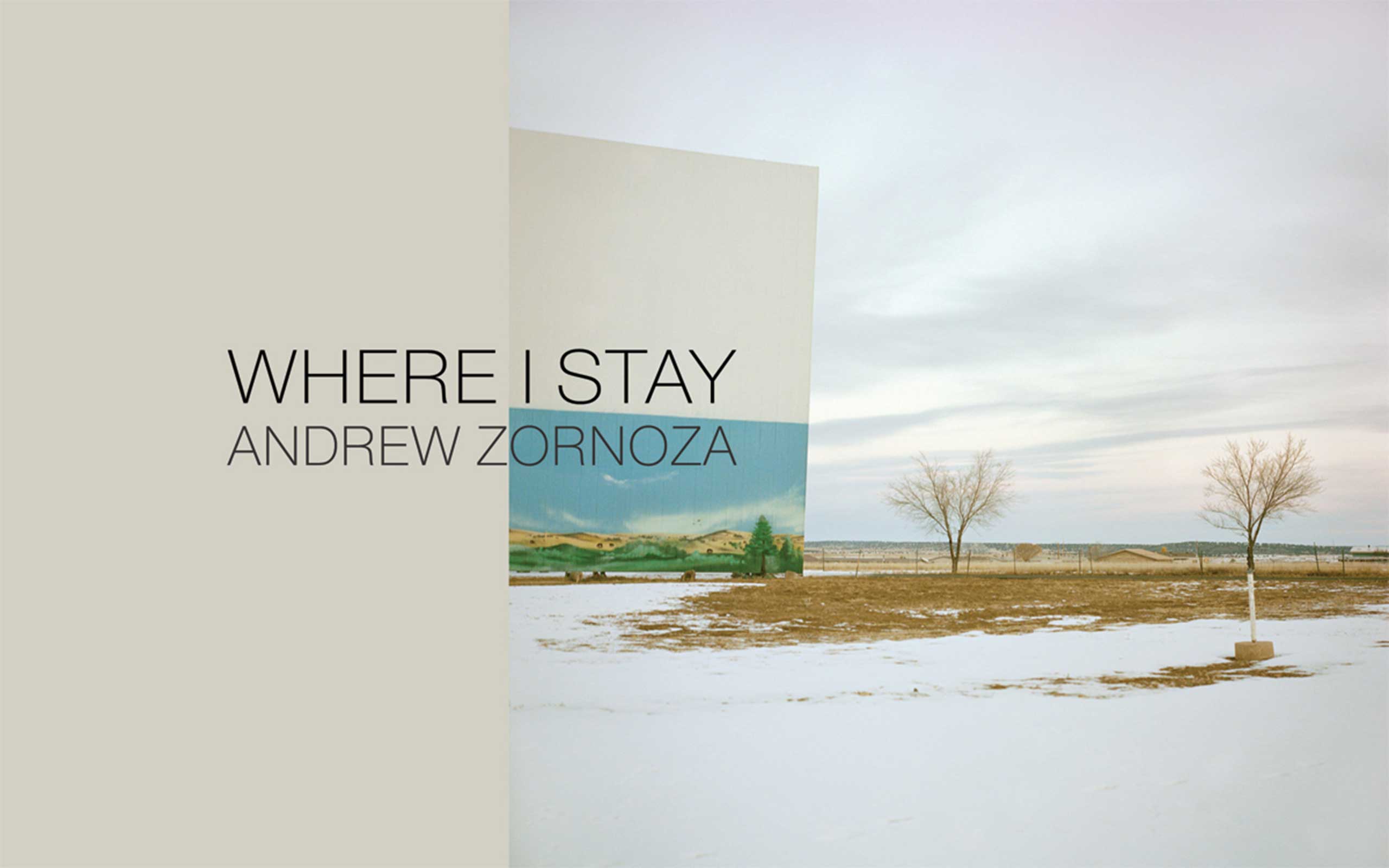Andrew Zornoza
Andrew Zornoza is the author of the novel Where I Stay, published by Tarpaulin Sky Press in 2009. Zornoza’s short fiction and essays have appeared in BOMB, Gastronomica, Confrontation, and CapGun, among many others. He was educated at Princeton University and teaches at Parsons Design & Technology MFA program, Gotham Writer’s Workshop and at the ASA Institute. He is a contributing editor to the arts journal Helping Orphans Worldwide (H.O.W.).


Andrew Zornoza
Andrew Zornoza is the author of the novel Where I Stay, published by Tarpaulin Sky Press in 2009. Zornoza’s short fiction and essays have appeared in BOMB, Gastronomica, Confrontation, and CapGun, among many others. He was educated at Princeton University and teaches at Parsons Design & Technology MFA program, Gotham Writer’s Workshop and at the ASA Institute. He is a contributing editor to the arts journal Helping Orphans Worldwide (H.O.W.).
In the process of constantly disappearing, the unhinged, unmoored and unnamed narrator of Where I Stay travels through a cracked North America, stalked by his own future self and the whispers of a distant love. From Arco, Idaho to Mexico City, he flees along the highways and dirt roads of a landscape filled with characters in transition: squatters, survivalists, prostitutes, drug runners, skinheads, border guards and con-men. Where I Stay is a meditation on desperation, identity, geography, memory, and love—a story about endurance, about the empty spaces in ourselves, about the new possibilities we find only after we have lost everything.
Really strange and beautiful use of photography in experimental literature…. Compact prose set to the rhythm of poetry…. Spare and sprawling interpretation of dislocated loneliness in being unmoored, in drifting away from connections and places until you become stuck somewhere again. (Allison Meier, Hyperallergic) Refreshing, pitch-perfect kind of steering that is innovative not only for the genre it might get called into, but for experiential and language-focused texts of every stripe…. Meditative and rhythmic in the mind of Mary Robison mashed with William Vollmann…. Unforgettable. (Blake Butler, HTML Giant) With a languorous but precise lyricism…. [Zornoza] is a cartographer of loneliness, doubt, and fear, one that fearlessly delineates the stark realms of disappointment, unrequited love, and unfulfilled dreams. (John Madera, Rain Taxi via Powell’s) Squarely situated between the ethos of Jack Kerouac and Walker Evans. Where I Stay is a novel of almost pure voice, told in diaristic fragments coupled with photographs whose captions are drawn from other moments in the time of the narrative. . . . a young man moving aimlessly through an America moving violently through him. In and out of cars, of the arms of lovers, looking for someone he lost, for a moment of rest. . . A year passes, days and weeks omitted, blank spaces where the lives of criminals, kind families, abandoned dogs and factory workers continue to be lived. . . . Those who filled his world he can now find “only in the cracks.” (The Review of Contemporary Fiction) Consider Andrew Zornoza’s Where I Stay a loose retelling of Werner Herzog’s 1974 march from Munich to Paris to try to save a dying friend—only set in the arid, ominous nowherescape of the contemporary Southwest and composed by a strung-out W.G. Sebald. Zornoza dedicates the book to “all those he’s lied to” before prosecuting a narrative in stark photographs and crisp, lurid text that will make you wish we had more liars like him in the world. (Matthew Derby) A gifted journey through borderlands between text and image, glassy prose and suggestively indirect prose poem, facts and fictions, sanity and the other thing, but most of all those borderlands crossed and recrossed on the West’s back roads—the kind that always exist just off the grid, just below the radar, and always in beautiful pieces. (Lance Olsen) Zornoza’s prose has range, which is what makes this book at times so beautiful and at other times so devastating. . . . Originality, vision, risks, and experimentation to give you back this country as it is: flawed, fractured, hypocritical, greedy, beautiful, breathtaking, mesmerizing, and the constant dialect of a lie and a truth. (Steven Karl) Zornoza finds meaning not only in the land and in travel, but conveys what is derived via both ordinary moments and dysfunctional situations…. [His] use of fragments of image and narration is expert. The movement of people and lives; chance meetings between strangers destined never to cross paths again; moments that can never be recreated; the uncertainty of people, place, relationships – all collide across culture and class, gender and race to form an anthem of displacement…. (Cynthia Reeser, NewPages) As haunting as it is gritty, Where I Stay has the feel of an impressionist watercolor and underscores the value of the small press in literary culture. Indeed, I hesitate to simply call it a book; its ambitions, beautifully realized, make it a hybrid of textual and visual arts. (Small Press Reviews)
Really strange and beautiful use of photography in experimental literature…. Compact prose set to the rhythm of poetry…. Spare and sprawling interpretation of dislocated loneliness in being unmoored, in drifting away from connections and places until you become stuck somewhere again. (Allison Meier, Hyperallergic) Refreshing, pitch-perfect kind of steering that is innovative not only for the genre it might get called into, but for experiential and language-focused texts of every stripe…. Meditative and rhythmic in the mind of Mary Robison mashed with William Vollmann…. Unforgettable. (Blake Butler, HTML Giant) With a languorous but precise lyricism…. [Zornoza] is a cartographer of loneliness, doubt, and fear, one that fearlessly delineates the stark realms of disappointment, unrequited love, and unfulfilled dreams. (John Madera, Rain Taxi via Powell’s) Squarely situated between the ethos of Jack Kerouac and Walker Evans. Where I Stay is a novel of almost pure voice, told in diaristic fragments coupled with photographs whose captions are drawn from other moments in the time of the narrative. . . . a young man moving aimlessly through an America moving violently through him. In and out of cars, of the arms of lovers, looking for someone he lost, for a moment of rest. . . A year passes, days and weeks omitted, blank spaces where the lives of criminals, kind families, abandoned dogs and factory workers continue to be lived. . . . Those who filled his world he can now find “only in the cracks.” (The Review of Contemporary Fiction) Consider Andrew Zornoza’s Where I Stay a loose retelling of Werner Herzog’s 1974 march from Munich to Paris to try to save a dying friend—only set in the arid, ominous nowherescape of the contemporary Southwest and composed by a strung-out W.G. Sebald. Zornoza dedicates the book to “all those he’s lied to” before prosecuting a narrative in stark photographs and crisp, lurid text that will make you wish we had more liars like him in the world. (Matthew Derby) A gifted journey through borderlands between text and image, glassy prose and suggestively indirect prose poem, facts and fictions, sanity and the other thing, but most of all those borderlands crossed and recrossed on the West’s back roads—the kind that always exist just off the grid, just below the radar, and always in beautiful pieces. (Lance Olsen) Zornoza’s prose has range, which is what makes this book at times so beautiful and at other times so devastating. . . . Originality, vision, risks, and experimentation to give you back this country as it is: flawed, fractured, hypocritical, greedy, beautiful, breathtaking, mesmerizing, and the constant dialect of a lie and a truth. (Steven Karl) Zornoza finds meaning not only in the land and in travel, but conveys what is derived via both ordinary moments and dysfunctional situations…. [His] use of fragments of image and narration is expert. The movement of people and lives; chance meetings between strangers destined never to cross paths again; moments that can never be recreated; the uncertainty of people, place, relationships – all collide across culture and class, gender and race to form an anthem of displacement…. (Cynthia Reeser, NewPages) As haunting as it is gritty, Where I Stay has the feel of an impressionist watercolor and underscores the value of the small press in literary culture. Indeed, I hesitate to simply call it a book; its ambitions, beautifully realized, make it a hybrid of textual and visual arts. (Small Press Reviews)



